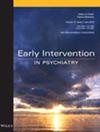The Relationship of Social Cognition on Social Circle Size and Social Support in Young Adults Recovering From First Episode Psychosis
Abstract
Background
Young adults who experienced first episode psychosis (FEP) show impairments in social cognition, have smaller social circles, and experience less social support compared to their peers. While social cognition is important for social functioning, it is unclear whether these neurocognitive skills are related to social circle size or social support. It was examined whether participants with FEP and impairments in social cognition have smaller social circles and/or experience less social support.
Method
A cross-sectional study comparing 35 FEP participants in early recovery and 35 well-matched controls on measures of emotion perception, theory of mind (ToM), social perception, social circle size, and social support, and the relationship between social cognitive impairment, social circle size, and social support.
Results
Significant differences between the two groups were found only for ToM and not for emotion perception or social perception. FEP participants had a significantly smaller social circle size and perceived significantly less social support. Correlations between ToM and social circle size or social support were limited, with no significant differences when compared at the group level.
Conclusion
FEP participants and controls differ on social circle size and social support, while concerning social cognition, there was only a difference found on ToM between both groups. Questions are raised as to whether social cognition is related to social circle size or perceived social support in early recovery of FEP. While mechanisms influencing social circle size and social support need further research, it is important to continue to focus on social contact after FEP.

 求助内容:
求助内容: 应助结果提醒方式:
应助结果提醒方式:


